At the presentation of its priorities for 2024, the Bertelsmann Stiftung welcomed Federal Chancellor Olaf Scholz to its Berlin premises at Werderscher Markt for a panel discussion with political scientist Ivan Krastev and Bertelsmann Stiftung Executive Board member Daniela Schwarzer. In addition to Liz Mohn and members of the Bertelsmann Stiftung Board of Trustees, other renowned figures from the political arena, civil society, academia, business community and media accepted the foundation’s invitation to attend the debate. “Strengthen democracy!” is the right topic at the right time, as the gathering in Berlin showed.
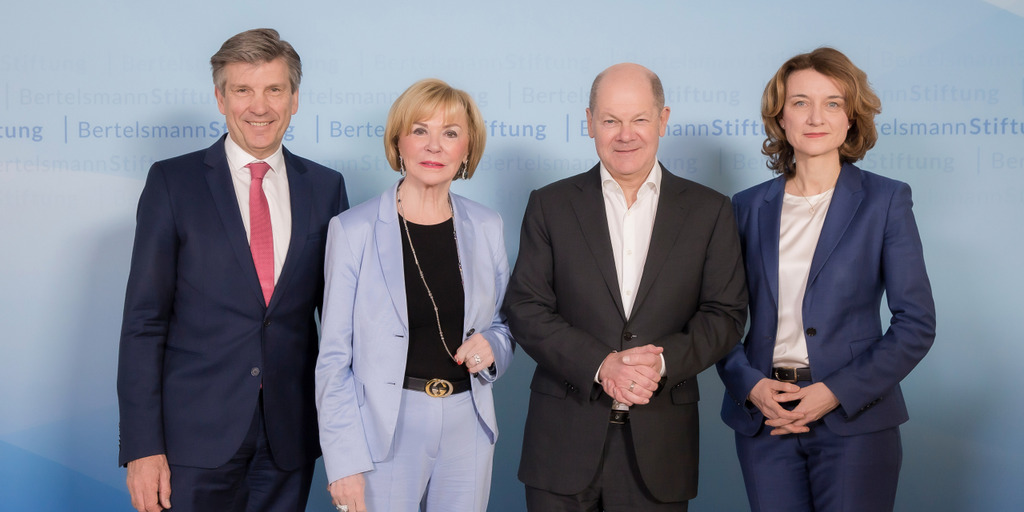
Sebastian Pfütze
Daring to be more confident: kick-off event for “Strengthen democracy!”
The Bertelsmann Stiftung presented its topic for 2024 – “Strengthen democracy!” – at a kick-off event in Berlin, with Olaf Scholz as its most prominent guest. Germany’s federal chancellor called on people everywhere to take responsibility for democracy, encouraging them to shape the future with confidence, saying, “Democracy – that’s us.” Based on new findings from the Bertelsmann Stiftung’s Transformation Index, which were also presented at the event, renowned international experts then discussed the current state of democracy worldwide, as well as the ways it is endangered and its prospects for the future.
Content
In his opening remarks, Ralph Heck, our chairman and CEO, outlined why the foundation chose this focus topic. “The perpetuation of democracy and social cohesion are core concerns in terms of the work we do. Especially in the current situation with its many geopolitical challenges, this work seems more important than ever,” he said. Heck used the opportunity to thank the federal chancellor and all politically committed people in Germany for their daily efforts to ensure society’s well-being and to preserve democratic values.
"Democracy depends on us as citizens"
At the start of the panel discussion between the federal chancellor and Bulgarian political scientist Ivan Krastev, our board member Daniela Schwarzer, who also moderated the panel, noted that the German public has never discussed – in government institutions, in the media and on the streets – the state of democracy and its ability to defend itself as intensely as it has in recent months. Scholz immediately addressed this fact. “There is broad support for democracy, for the rule of law and the social market economy, and we can build on this,” he said. “Our democracy is neither a play nor a TV show. Democracy – that’s us. It depends on us as citizens and we must protect it.” According to Scholz, that is why the message is very important which was sent by the numerous demonstrations throughout the country supporting democracy and opposing right-wing extremism, something which impressively refuted the false impression that the right-wing populists’ march to victory is unstoppable.
Krastev also emphasized that Europe’s right-wing parties are not inevitably gaining ground. “They want to take a trip into the past. But the past can’t make the future,” said the chairman of the Centre for Liberal Studies. “At the same time, every European country is experiencing today’s multiple crises to varying degrees. In Germany, migration is seen as the biggest problem, whereas in Poland and the Baltic states it’s the war in Ukraine, and in Southern Europe it’s more the economic situation.” That is why there cannot be a single coordinated European response for solving the crises, Krastev noted, and right-wing forces are skillfully exploiting this fact. What is more, Germans’ fear of the future stems largely from concerns about a loss of prosperity. “In post-war Germany, economic performance underpinned democracy,” Krastev said. “Now the country is to some degree the victim of its own decades-long success. The Federal Republic will therefore have a hard time if it and the EU are not successful in remaining competitive.”
Having the courage to shape the future
Scholz agreed that, as the world’s fourth-largest economy, Germany has a lot to lose, but clearly stated: “I do not accept the explanation that people are voting for right-wing parties because things are supposedly difficult for them.” Asked by Schwarzer about eroding confidence, especially among the middle class, Scholz replied, “We can only look to the future with confidence if we create it ourselves. The future will not simply be imposed on us, but requires the will to shape it.” The federal chancellor cited four areas that he feels are crucial for boosting confidence in Germany: a faster and more responsive bureaucracy; more controlled immigration of skilled workers and less illegal migration; more investments in security and defense; and, in society in general, more optimism when it comes to technological advances as the key to maintaining prosperity.
When the topic is democracy’s ability to defend itself, the question rapidly arises of Russia’s invasion of Ukraine and its consequences. “Breaking the agreement that Europe’s borders should no longer to be changed through force is a threat to us all,” emphasized Scholz. In terms of the security policy debate in Germany, the federal chancellor expressed the wish that people would reflect more and get upset less. Krastev noted that the war in Ukraine has also highlighted the EU member states’ different perspectives. “In Germany and France, concerns about a nuclear conflict predominate, while in Poland and the Baltic states it’s about being occupied by Russia.” The political scientist, whose native country Bulgaria was part of the Soviet zone of influence until the early 1990s, called for ongoing support for Ukraine, saying, “If the west supplies ammunition, that will impress Russia much more than grandiose speeches.”
Krastev called on the larger EU states – especially Germany – to respond more to the needs of smaller members, and not only in the context of the war in Ukraine. This is particularly important in light of the upcoming European elections, he said, adding that the electoral victory in Poland of EU-friendly Donald Tusk provides a significant opportunity for greater unity within the European Union. Scholz picked up the thread, emphasizing Germany’s willingness to fulfill this responsibility. “As a major nation in the heart of Europe, we must make advancing the EU one of our national tasks,” the federal chancellor said at the discussion’s conclusion.
BTI findings: democracies still in retreat
The development in Poland mentioned by Krastev remained present during the second half of the event, since the Eastern European country offers one of the few bright spots in the new results from the Bertelsmann Stiftung’s Transformation Index (BTI), as the audience in Berlin learned during the presentation of the BTI’s key findings. Every two years, the BTI reveals how the ratio of democracies to autocracies has changed. The bad news: Democracy is still on the decline, with only a minority of 63 of the 137 countries analyzed now having a democratic government. “At the same time, we see that a reversal in this trend is possible,” explained Sabine Donner, senior expert at the Bertelsmann Stiftung. “This can be seen in the outcomes of elections in Poland and Brazil, as well as elections in African states such as Kenya and Zambia.” Her colleague and BTI co-author Hauke Hartmann pointed out the weaknesses evinced by autocratic regimes. “Autocracies are more corrupt than democracies and have inferior conflict management, since they are not geared towards seeking consensus,” he said.
"Once they’re in power, they change the rules"
In the subsequent discussion of the BTI findings, again moderated by Daniela Schwarzer, Nic Cheeseman, professor of Democracy and International Development at the University of Birmingham, also addressed the issue of autocratic regimes and their shortcomings. According to Cheeseman, autocracies often disappoint people’s hopes for greater growth and prosperity, which is why the pendulum could swing back in favor of democracy in the next 10 to 15 years. “But it won’t happen automatically,” he warned. “If we don’t do anything now to strengthen the existing democracies, next time we’ll be sitting here and half of all the world’s countries will be autocracies.”
Zsuzsanna Szelényi initially joined Fidesz when Hungary was undergoing its democratic transformation at the end of the 1980s, then left the political party after it moved to the right. She described the autocratic changes her native county has experienced under Viktor Orban’s leadership, saying, “There is nothing democratic about Hungary anymore, it only has the veneer of a democracy.” That is why the political scientist advises other countries to use constitutional means to prevent such parties from coming to power in the first place, “because once they are in power, they change the rules to their own benefit.”
New ideas on how democracies intend to shape change
Krastev noted that, Hungary and other examples notwithstanding, it would be wrong to view right-wing populism as an Eastern European phenomenon. “After all, there are also strong and growing right-wing populist movements in Western European countries such as France,” he said. “What particularly concerns me is what is happening among the younger generation since, of all demographic groups, Europeans under the age of 28 are the most skeptical of democracy.”
Despite their different backgrounds and horizons of experience, the experts were able to agree on a number of priorities for taking action: Democracies must increase the resilience of their government institutions. More transnational cooperation and a greater exchange of experience are also needed between democratically oriented opposition parties. In addition, democracy must become more appealing to the younger generation. And, according to Zsuzsanna Szelényi, one crucial point is that “we need new and, above all, convincing ideas on how democratic societies intend to shape change.”
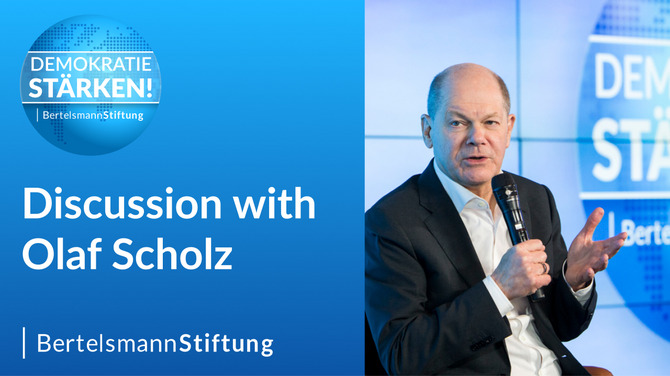
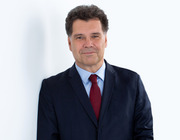
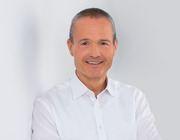

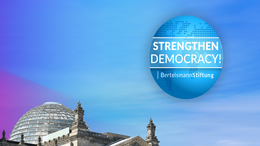
![[Translate to English:] viele Fragezeichen liegen übereinander. Auf der rechten Seite sticht ein rotes Fragezechen hervor.](/fileadmin/files/_processed_/c/2/csm_AdobeStock_204180371_KONZERN_ST-DZ_08_875fcc023d.jpg)


